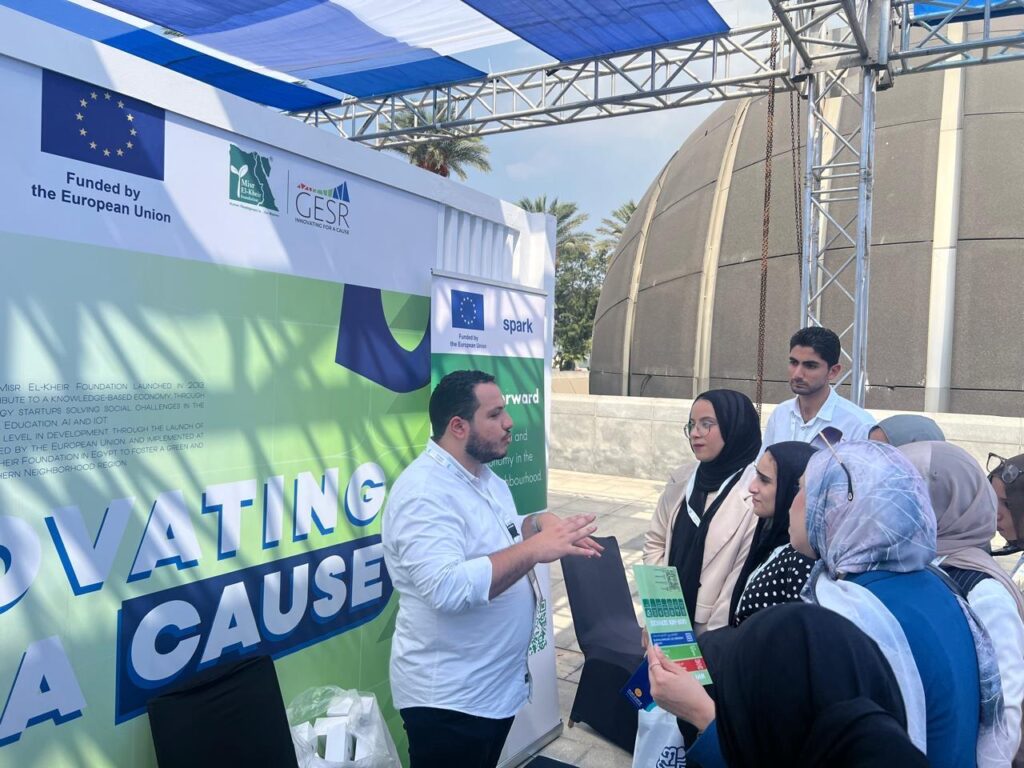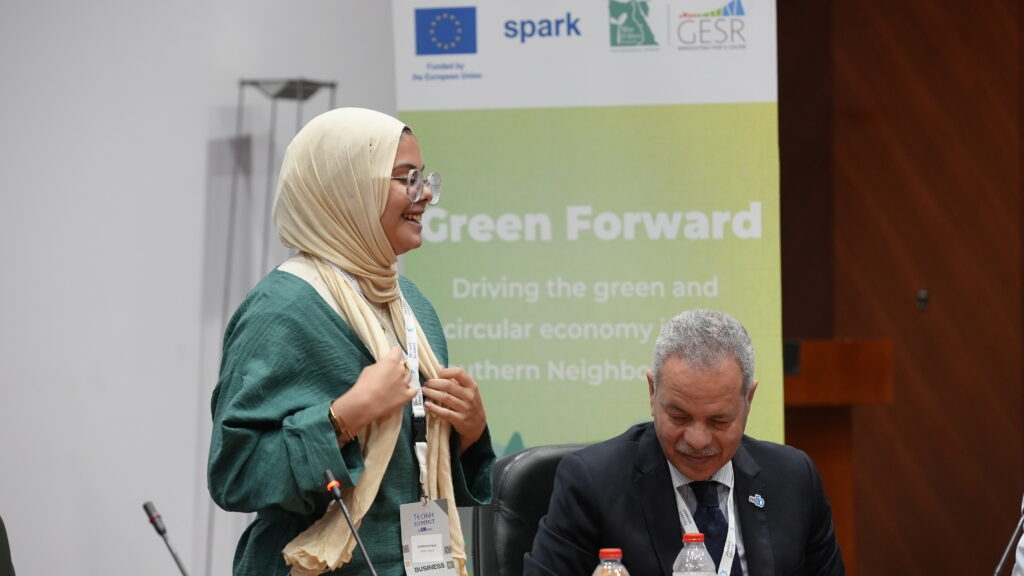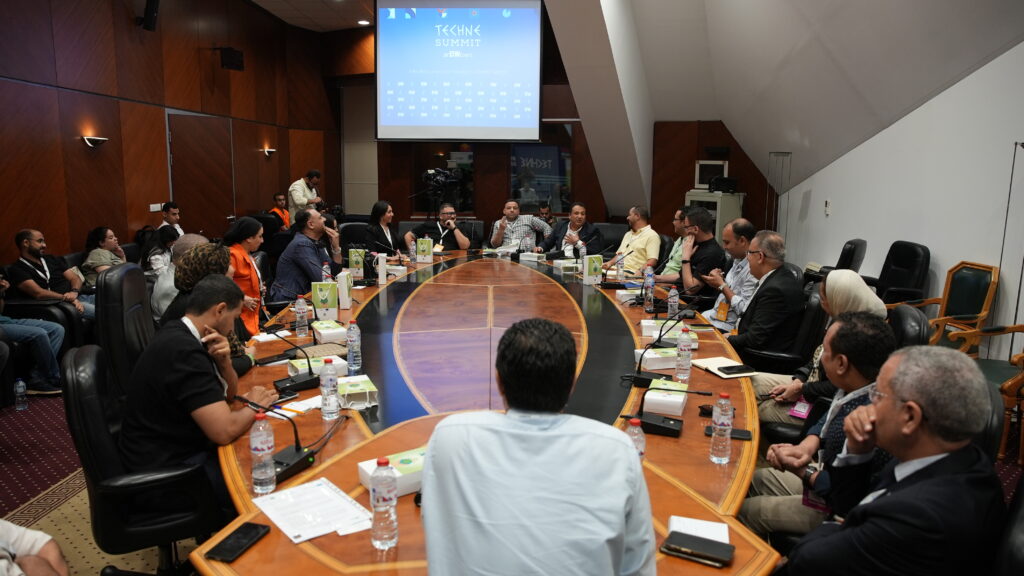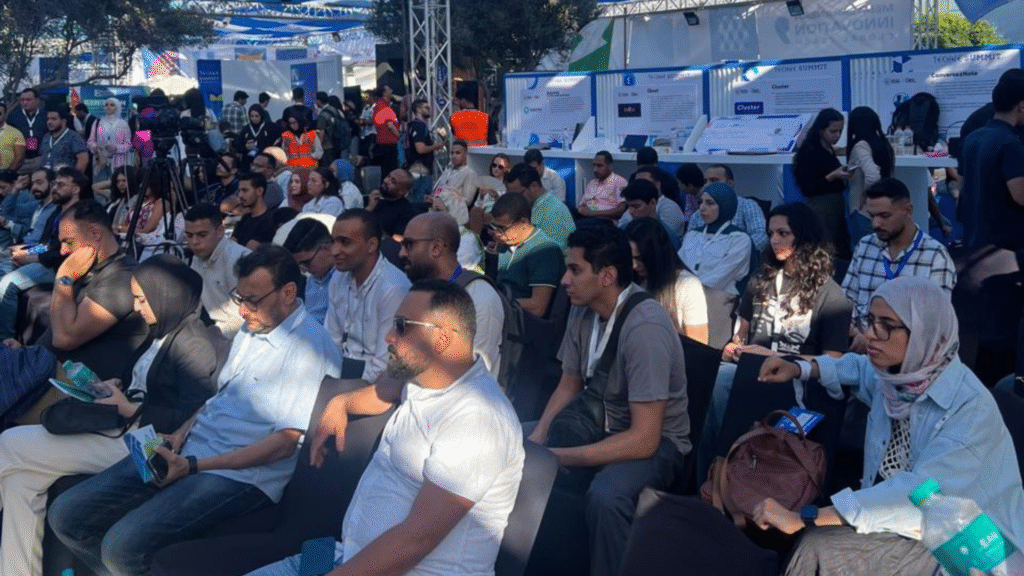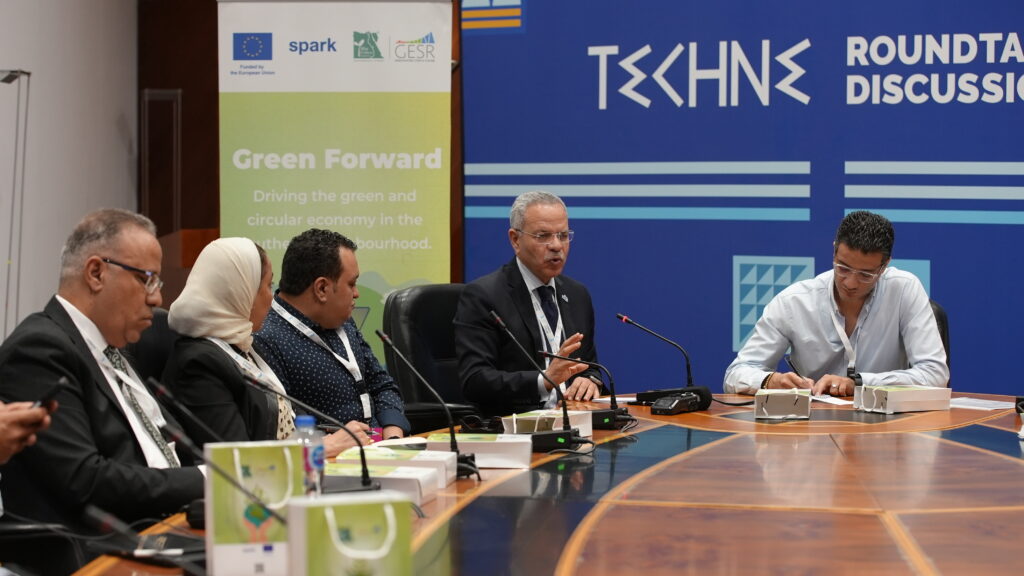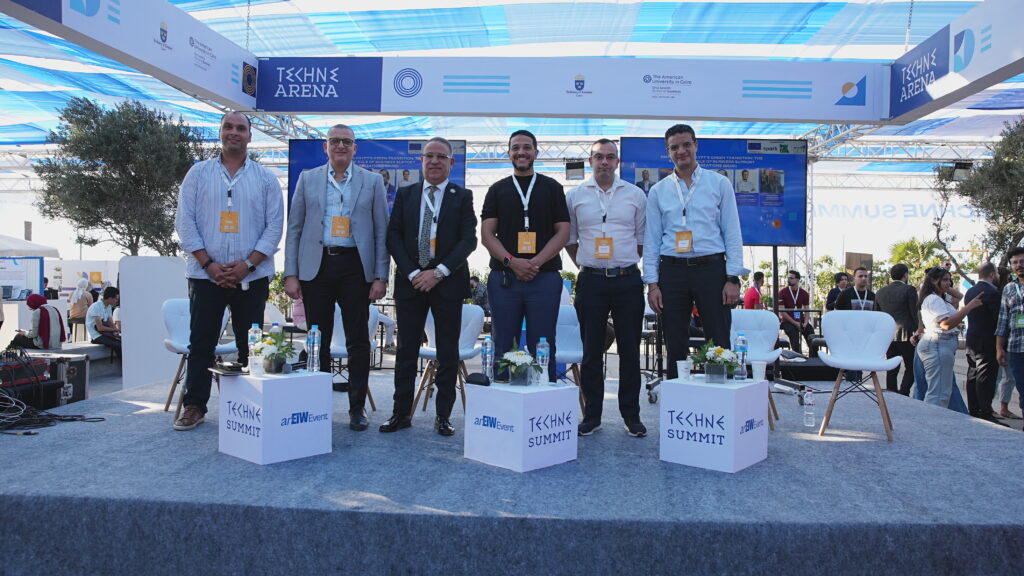Green Forward (Meso): Empowering Egypt’s green transition through business support organisations

In October 2025, Egypt hosted a key milestone of SPARK’s Green Forward meso-level intervention, funded by the European Union and implemented in Egypt in partnership with GESR – Misr El Kheir Foundation. GESR – MEK collaborated with Techne Summit, an international investment and entrepreneurship event held in Egypt that focuses on the Mediterranean region. The collaboration aimed to connect startups, investors, business support organisations (BSOs), and corporations to promote innovation and partnership development.
In this context, GESR – Misr El Kheir led a panel discussion titled “Empowering Egypt’s Green Transition: The Strategic Role of Business Support Organisations (BSOs)”, which convened experts from the Egyptian government, academia, consulting, and the private sector. The session explored how different actors can collectively strengthen Egypt’s green transition through innovation, capacity-building, and entrepreneurship.
Moderated by Dr. Mohamed Abbas, Head of Innovation, Management of Technology and Entrepreneurship at the Ministry of Industry and the Green Forward Project Lead at GESR – MEK in Egypt, the discussion featured:
- Dr. Mohamed Abdelhameed, General Manager, Technology & Industrial Innovation Centers (Ministry of Industry)
- Prof. Dr. Mohamed Galal, Director of Innovation, Entrepreneurship and Technology Commercialization (IETC Center)
- Dr. Ahmed Saber Abo Khadra, CEO (Egypt Elite Consulting)
- Eng. Ahmed Khaled, Sustainability Consultant and Circular Economy Expert
- Eng. Mohamed Ehab, Co-founder (Waste Marche)
Opening the discussion, Dr. Mohamed Abbas introduced the concept of Business Support Organisations (BSOs) as entities that assist startups and entrepreneurs, particularly through sector-specific support. He highlighted the significance of the Green Forward programme, funded by the European Union and implemented by SPARK, which aims to empower BSOs in supporting the green and circular economy in the Southern Neighbourhood region. The panel highlighted the following key takeaways:
Perspectives from government, academia, and the private sector in Egypt:
The panel offered a comprehensive look at Egypt’s green transition through the lenses of public institutions, academia, and private sector innovators. Each perspective revealed how different actors, acting as or alongside Business Support Organisations (BSOs), contribute to strengthening the country’s sustainability ecosystem.
- Government as a green enabler
Representing the Ministry of Industry, Dr. Mohamed Abdelhameed shed light on Egypt’s network of 12 technology centres covering sectors from textiles to plastics and furniture.
“Our role spans from product design to prototype validation and market entry,” he explained. “We prioritise resource efficiency, waste management, and support for green manufacturing practices. Sustainability, from our standpoint, is about optimising performance while minimising emissions and waste.”
These centres function as government-led BSOs within the industrial ecosystem, helping enterprises integrate sustainability principles into production and adopt greener business models.
- Academia as an innovation hub
Building on the government’s structural perspective, Prof. Dr. Mohamed Galal emphasised academia’s pivotal role in embedding green entrepreneurial thinking early on.
“Everyone-engineers, scientists, accountants-starts as a student,” he said. “We embed entrepreneurial and intrapreneurial mindsets from the start of their journey.”
At Al-Azhar University, six technological incubators support students from ideation to market. Through initiatives such as the E-Club, hackathons, and partnerships with organisations like Misr El Kheir (MEK) and the Academy of Scientific Research & Technology (ASRT), the university encourages applied innovation. Over 250 startups have been incubated so far.
In this context, universities act as academic BSOs, providing young innovators with access to labs, expert mentorship, and opportunities to turn ideas into viable green enterprises. Dr. Galal also highlighted intrapreneurship-the ability of graduates to innovate within existing organisations-as a way for BSOs to extend their impact beyond startup creation.
- Startup perspective: Adaptation and growth
Complementing the academic and policy views, Eng. Mohamed Ehab, co-founder of Waste Marche, shared the private sector’s hands-on experience navigating the realities of the green market.
“We started as an e-commerce platform where factories listed waste materials and recycling companies could bid to purchase them,” he noted. “But challenges such as informality and lack of infrastructure led us to pivot.”
Today, Waste Marche derives most of its revenue from consulting and capacity-building for SMEs. It now operates as a private-sector BSO, reflecting how adaptability and ecosystem engagement can sustain green ventures amid changing market realities and this by supporting other companies in their green transition.
The consulting and mentorship role of BSOs
Business Support Organisations (BSOs), including consulting firms, advisory entities, and technical assistance providers, play a pivotal role in advancing Egypt’s green transition. By offering practical guidance, mentorship, and capacity-building, they help entrepreneurs, institutions, and enterprises adopt more sustainable business models.
Dr. Ahmed Saber Abo Khadra underlined that supporting the green economy requires a multi-level approach, where BSOs play a connecting role between education, entrepreneurship, and national priorities.
“Our work covers three dimensions: training for students and universities, mentorship for startups, and alignment with national sustainability priorities,” he said.
He emphasised the importance of helping green entrepreneurs define their value proposition, find market fit, and adopt multidisciplinary thinking-skills that BSOs and mentors help nurture to build resilient green businesses.
Complementing this perspective, Eng. Ahmed Khaled highlighted the persistent challenge of greenwashing, noting that BSOs and consulting experts have a role in promoting credible, measurable sustainability practices.
“Many entities claim to be green, but greenwashing is a major challenge. Green isn’t just about solar panels-it’s about operational decisions and sustainable behaviours.”
He pointed to the Green Star Certification for eco-friendly hotels as a successful example. The initiative, now integrated into Egypt’s national school curriculum, trained more than 3,200 hospitality staff ahead of COP27-boosting awareness of sustainable operations from 20% to 80% in just one month.
Together, these insights show how BSOs, through consulting and mentorship, help translate sustainability concepts into practical actions, supporting institutions, startups, and industries in Egypt’s broader green transition.
Key takeaways:
Academia’s foundational role:
Universities are crucial in embedding sustainability and entrepreneurship skills early on. Academia acts as a knowledge-based BSO by bridging research and market needs, ensuring that innovation translates into tangible impact through mentorship and incubation.
Government support as a catalyst:
Technology and innovation centres under the Ministry of Industry serve as public BSOs, promoting green manufacturing and offering practical, sector-specific support to enterprises. Their work demonstrates how institutional frameworks can accelerate the green transition.
Adaptability in green startups:
Waste Marche’s experience underscores the importance of agility, responding to ecosystem gaps and pivoting towards scalable sustainability services. As emerging private-sector BSOs, such startups provide peer learning and sector insights that enrich the broader ecosystem.
Expanding the role of BSOs:
Beyond traditional business support entities, universities, ministries, and even startups can function as BSOs: offering mentorship, technical expertise, and access to markets to accelerate Egypt’s green transition.
Concluding the discussion, Dr. Mohamed Abbas highlighted how the landscape of higher education and entrepreneurship is shifting toward practical, market-oriented innovation.
“Graduates are transitioning from passive learners to potential entrepreneurs. Programmes like Green Forward, together with active BSOs across academia, government, and private sectors, are key to enabling the green transition.”
The discussion made clear that everyone has a part to play in the green transition,from students to policymakers, shaping a future that is both sustainable and resilient.
—
Green Forward is a European Union-funded initiative implemented by a consortium of partners working across three complementary levels:
- Expertise France (at the macro level): leads the development of enabling green policies, legislation, and standards in close collaboration with national authorities and regional stakeholders.
- SPARK (at the Meso level): focuses on strengthening the capacity of Business Support Organisations (BSOs) to act as effective ecosystem enablers.
- UNIDO (at the micro level): supports small and medium-sized enterprises (SMEs) through targeted technical assistance, promoting the adoption of circular economy practices and improving access to green finance.
Related news
-
![]() News
NewsGreen Forward: Key insights from the regional launch event on green and circular economy
-
![]() News
NewsBridging Innovation and Digital Transformation: Palestine’s Knowledge Exchange Experience in Egypt
In the context of business development, digitisation refers to converting traditional functions into digital formats to enhance efficiency, such as…
-
![]() News
NewsThe EU, SPARK, UNIDO, and Expertise France set a vision for a green economy in the Southern Mediterranean region through the“Green Forward” initiative
As part of the IGNITE conference in Amman, Expertise France, SPARK, UNIDO, and the European Union introduced the Green Forward…

